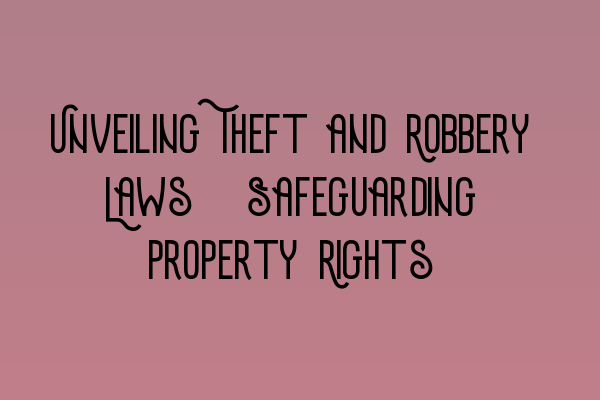Unveiling Theft and Robbery Laws: Safeguarding Property Rights
Property rights are a fundamental aspect of our legal system, ensuring the protection and security of individuals’ belongings. It is essential for both individuals and businesses to understand the laws surrounding theft and robbery, as they play a crucial role in safeguarding property rights. In this article, we will delve into the details of theft and robbery laws in the UK, shedding light on their definitions, penalties, and possible defenses.
Theft: Understanding the Offense
Theft is a criminal offense that involves dishonestly appropriating someone else’s property with the intention of permanently depriving them of it. The key elements of theft include dishonesty, appropriation, property belonging to another, and the intention to permanently deprive. Let’s analyze these elements to gain a better understanding:
- Dishonesty: Theft requires an element of dishonesty, meaning that the accused must act in a way that society considers to be dishonest. This could involve various forms of deception or deceit.
- Appropriation: Appropriation refers to the assumption of the rights of an owner over the property. It can involve physically taking the property, receiving it, or obtaining control over it.
- Property Belonging to Another: Theft involves taking property that belongs to someone else. This could be personal belongings, money, or even intellectual property.
- Intention to Permanently Deprive: The accused must have the intention to permanently deprive the owner of their property. This means the intention to never return the property or to dispose of it in a way that the owner cannot recover it.
If an individual is found guilty of theft, they may face significant penalties, including fines and imprisonment. The severity of the punishment depends on the value of the stolen property and the circumstances of the offense.
Robbery: A More Serious Offense
While theft involves dishonestly appropriating someone else’s property, robbery takes it a step further by involving the use of force or threat. The key elements of robbery include the act of stealing, the threat or use of force, and the presence of the victim. Let’s explore these elements in more detail:
- Act of Stealing: Robbery, like theft, involves the act of stealing someone else’s property.
- Force or Threat: Unlike theft, robbery requires the use of force or the threat of force to intimidate the victim. This could involve physical violence, the use of weapons, or verbal threats.
- Presence of the Victim: Robbery requires the presence of the victim at the time of the offense. The victim must be aware of the theft and the threat or force used against them.
Robbery is considered a more serious offense than theft due to the added element of violence or the threat of violence. The penalties for robbery can be severe, including lengthy prison sentences.
Defenses Against Theft and Robbery Charges
When facing theft or robbery charges, it is crucial to understand that there may be viable defenses available. Some common defenses include:
- Lack of Intention: If there is evidence to suggest that the accused had no intention to permanently deprive the owner of their property, it may serve as a defense.
- Lawful Claim to the Property: If the accused genuinely believed they had a lawful right to the property, it can be a valid defense against theft or robbery charges.
- Mistaken Identity: If there is reasonable doubt regarding the identity of the perpetrator, a mistaken identity defense may be applicable.
- Coercion: In some cases, the accused may have committed the offense under duress or coercion. This can be presented as a defense in certain circumstances.
It is essential to consult with a qualified criminal defense solicitor to determine the best defense strategy based on the specific circumstances of the case.
Conclusion
Understanding theft and robbery laws is crucial for safeguarding property rights. Whether you or someone you know is facing theft or robbery charges or simply wants to ensure compliance with the law, it is essential to seek professional legal advice. At SQE Criminal Law & Practice Law UK, we offer comprehensive legal services to protect your rights and provide expert representation in criminal defense cases. Contact us today to learn more about our services and how we can assist you.
Related Articles:
- SQE 1 Practice Exam Questions
- SQE 1 Practice Mocks FLK1 FLK2
- SQE 2 Preparation Courses
- SQE 1 Preparation Courses
- SRA SQE Exam Dates
